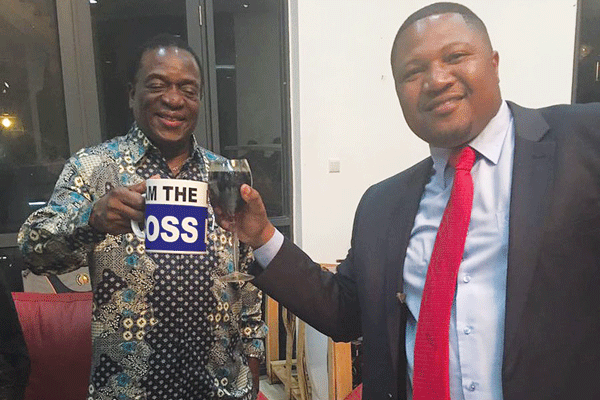
THE command mantra being spread by Vice-President Emmerson Mnangagwa as a new economic game of economic salvation is just but an old failed economic development model. As a matter of fact dirigisme has always existed only to be abandoned because of monumental failure.
Jacob Mafume,PDP Spokesperson
In Eastern Europe command economics was implemented during the Cold War era, to use the words of Cathleen Giustino a scholar with Auburn University in Alabama the countries implementing it during that era, “gravely failed.”
We are aware of the fact that Mnangagwa’s dirigiste approach is motivated by the State capitalism approach as it is in China today, critics of the same have been done including in academic circles. The most popular reference we make is the work by Tony Cliff. We make the point that both the results and the literature around command economies discredit this approach.
For anyone to try and preach the command gospel in the 21st century era is insanity of the highest order. The claim by Mnangagwa that the command system is the miracle the country needs only displays his obsolete thinking coupled with idiocy.
The PDP is, however, aware of the fact that the world over shocking political pronouncements will always been made.
Just like Mnangagwa, Jeremy Corbyn and the Labour Party in the United Kingdom recently made a promise to renationalise the energy sector, the royal mail and the rail.
We restate that Mnangagwa has never been and is not known for ideas; he is undisputedly known for violence and his excessive use of hardware in politics.
- Chamisa under fire over US$120K donation
- Mavhunga puts DeMbare into Chibuku quarterfinals
- Pension funds bet on Cabora Bassa oilfields
- Councils defy govt fire tender directive
Keep Reading
More appalling is his guts and an attempt to make an academic case for this long failed idea as evidenced by his presentation at Midlands State University yesterday.
His basis for command economics is anchored on a wrong foundation, a view that the bumper harvest in the country is a result of command agriculture.
We argued before as we do now that the bumper harvest in Zimbabwe is a combination of a good rain season coupled with the hard work of the Zimbabwean farmer, many of whom are not beneficiaries of the highly politicised scheme. The PDP is also aware that the people, who are in support of Mnangagwa’s command tactics are the same people who are pushing for his presidency. His insatiable thirst for the crown is self-evident. It’s a destructive compulsive attraction to power that will sadly have a tragic end.
He is, however, an individual whose incompetency is known to them, therefore, they would not even consider him for presidency in their own countries, such hypocrisy. Who would consider Mnangagwa as the Prime Minister of the United Kingdom, for instance?
There are no short cuts that the State can take in addressing the economic decay. There is need to address the structural challenges arresting the economy as well as deal with basic economic fundamentals. As we stated before the solution to the Zimbabwean economic crisis includes the following.
Attend to macroeconomic stability; in this regard we contend that fiscal discipline must be maintained and that the government must immediately resort to the principle of cash budgeting.
Financial sector stability and liquidity by scrapping the bond note, paying back the stolen RTGS balances, promotion of plastic money and in the long term facilitating a regional monetary union.
Industrialisation through a shift from an extraction model to beneficiation, repealing the indigenisation law and investing in infrastructure which makes it easy to do business.
Rationalisation of the 2017 Budget, reduce the Budget to an achievable target of $3 billion which can fully be covered by domestic revenues and also develop external partnerships that can take care of social sector obligations in areas like BEAM, flood victims support and drug procurement.
Retrenchment of expenditure, rationalising the wage bill by dealing with the issue of ghost workers State-owned enterprises at least 30% of GDP is being drained through State-owned enterprises that have become a vehicle of patronage. State enterprises are increasing domestic debt, making reform of the institutions urgent.
Restoration of land value, the revival of the agricultural sector is predicated upon the restoration of the land value through the issuance of land title ie title deeds to all the beneficiaries of the land reform programme.
Mining, Zimbabwe is endowed with world class reserves of commodities which, however, are regulated by imperial regulation that promotes primitive accumulation and self-aggrandizement. There is need to create a framework for value addition, transparent allocation of mining rights and spatial linkages in the sector.
International re-engagement, end isolation of the nation, dealing with the debt question and negotiate a martial plan aimed at reconstruction.
Together another Zimbabwe is possible.











